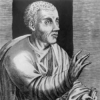Quintilian

Quintilian
Marcus Fabius Quintilianuswas a Roman rhetorician from Hispania, widely referred to in medieval schools of rhetoric and in Renaissance writing. In English translation, he is usually referred to as Quintilian, although the alternate spellings of Quintillian and Quinctilian are occasionally seen, the latter in older texts...
NationalityRoman
ProfessionEducator
journey ideas crowds
In a crowd, on a journey, at a banquet even, a line of thought can itself provide its own seclusion.
hypocrisy wish fool
Those who wish to appear learned to fools, appear as fools to the learned.
memories liars army
A liar ought to have a good memory.
desire pleasure forbidden-fruit
Forbidden pleasures alone are loved immoderately; when lawful, they do not excite desire.
great-change effects
Nature herself has never attempted to effect great changes rapidly.
natural-gifts useless natural
Without natural gifts technical rules are useless.
broken-heart evil broken-promises
Where evil habits are once settled, they are more easily broken than mended.
pride taught knows
There is no one who would not rather appear to know than to be taught.
experience valuable
In almost everything, experience is more valuable than precept.
song men rude
Men, even when alone, lighten their labors by song, however rude it may be.
persons ifs generous
A Woman who is generous with her money is to be praised; not so, if she is generous with her person
teaching quality students
Study depends on the goodwill of the student, a quality that cannot be secured by compulsion.
children nurse firsts
It is the nurse that the child first hears, and her words that he will first attempt to imitate.
character mind matter
The mind is exercised by the variety and multiplicity of the subject matter, while the character is moulded by the contemplation of virtue and vice.